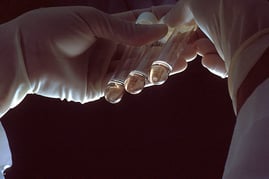BioResearch Product Faire™
Tags: Emory University, University of Alabama, BioResearch Product Faire™, Virtual, 2021
(Article posted 2015 and updated in 2016)
Patients with a condition known as lung nodules may soon be breathing a bit more easily, thanks to research funding granted to the University of California, Davis and a new diagnostic technology tested in a 2016 study at the Morehouse School of Medicine and Emory University. Lung nodules are usually benign, small lesions often found in CT chest scans. While only 2% of these nodules end up being cancerous, they still require examination and monitoring to ensure the safety of the patient.
Read MoreTags: CA, Emory University, University of California Davis, cancer research, California, Cancer, UCDMC, BioResearch Product Faire Event, Research Funding, Sacramento, Davis, UC Davis - Medical Center, research grants, lung cancer
Posted by Laura Braden on Tue, Jan 26, 2016
 As people get older, their bodies become more susceptible to certain diseases. Cancer, among others, is a disease that becomes more common as people age. David S. Yu, M.D., Ph.D from Emory University was recently awarded $1.6 million from the National Institutes of Health (NIH) to study the gene SIRT2 and how it can be manipulated to control the effects of aging and prevent cancer.
As people get older, their bodies become more susceptible to certain diseases. Cancer, among others, is a disease that becomes more common as people age. David S. Yu, M.D., Ph.D from Emory University was recently awarded $1.6 million from the National Institutes of Health (NIH) to study the gene SIRT2 and how it can be manipulated to control the effects of aging and prevent cancer.
Tags: Emory University, Aging, cancer research, Southern, Emory, Atlanta, GA, 2016, BioResearch Product Faire
Posted by Laura Braden on Mon, Nov 30, 2015
 Cancer affects the majority of the population in one way or another, through knowing someone with cancer, being exposed to it in the media, or having it oneself. Cancer treatments and cures are some of the most well funded and highly researched areas in the life sciences. Researchers at the Winshop Cancer Institute at Emory University in Atlanta, GA recently discovered that an orange pigment, called parietin or physcion, that is found in lichens and rhubarb has potential to be used as an anti-cancer drug.
Cancer affects the majority of the population in one way or another, through knowing someone with cancer, being exposed to it in the media, or having it oneself. Cancer treatments and cures are some of the most well funded and highly researched areas in the life sciences. Researchers at the Winshop Cancer Institute at Emory University in Atlanta, GA recently discovered that an orange pigment, called parietin or physcion, that is found in lichens and rhubarb has potential to be used as an anti-cancer drug.
Tags: Emory University, Leukemia, cancer research, Southern, Cancer Treatment, Emory, BioResearch Product Faire Event, Atlanta, GA, Southern Region, 2016, Parietin, physcion
Posted by Laura Braden on Tue, Feb 24, 2015
Since the Human Immunodeficiany Virus (HIV) emerged as a global health problem, researchers have been diligently working to discover new vaccines to treat the disease. However, many of the current treatments for HIV tend to cause more infections and further damage instead of working as a cure.
Read MoreTags: Emory University, HIV, vaccine research, Southern, 2015, Emory, BioResearch Product Faire Event, Atlanta, GA, AIDS vaccine research, Yerkes National Primate Research Center
When the level of blood glucose, also called blood sugar, rises after a meal, the pancreas responds by releasing insulin into the bloodstream. Insulin helps cells throughout the body absorb glucose from the bloodstream and use it for energy.
Read MoreTags: Emory University, University of Georgia Athens, Diabetes, Southern, Georgia, 2015, Emory, UGA, BioResearch Product Faire Event, Atlanta, GA
Posted by Laura Braden on Wed, Jan 28, 2015
The University of Georgia in Athens and Emory University in Atlanta are two powerhouse research institutions, both receiving millions of dollars in annual funding to support research projects. Not only are researchers at these 2 universities hard at work on their own projects, but researchers from both institutions are also hard at work on collaborative projects between the schools.
Read MoreTags: Emory University, University of Georgia, Southern, 2015, Emory, UGA, BioResearch Product Faire Event, Athens, Atlanta, GA, Collaborative research projects
Posted by Laura Braden on Wed, Dec 31, 2014
 Alzheimer's is a devastating disease that causes memory loss, thinking and behavioral problems that get worse over time. Currently, there are no known cures for Alzheimer's, but there are some treatments available that can slow the onset of symptoms. Because of this need for a cure, Alzheimer's disease is heavily studied by researchers across the nation, and millions of dollars are given to Alzheimer's researchers annually to work towards finding more treatments and a potential cure. Earlier this year, researchers at Emory University in Atlanta, Georgia received a $7.2 million, five-year grant from the National Institutes of Health (NIH) to help support their research of this disease. (Image on right courtesy of Wikimedia Commons)
Alzheimer's is a devastating disease that causes memory loss, thinking and behavioral problems that get worse over time. Currently, there are no known cures for Alzheimer's, but there are some treatments available that can slow the onset of symptoms. Because of this need for a cure, Alzheimer's disease is heavily studied by researchers across the nation, and millions of dollars are given to Alzheimer's researchers annually to work towards finding more treatments and a potential cure. Earlier this year, researchers at Emory University in Atlanta, Georgia received a $7.2 million, five-year grant from the National Institutes of Health (NIH) to help support their research of this disease. (Image on right courtesy of Wikimedia Commons)
Tags: Emory University, Southern, 2015, Emory, BioResearch Product Faire Event, Atlanta, GA
Posted by Laura Braden on Wed, Oct 29, 2014
Fragile X syndrome is a neurodegenerative, genetic disease that causes intellectual, behavioral, and learning challenges. According to the CDC, it is the most common cause of inherited intellectual disability and even though it affects both men and women, it occurs more commonly and more severely in men. There are many other diseases associated with Fragile X, such as autism and epilepsy. Currently, there are no cures for the syndrome, but there are treatments that can help people suffering from the disorder learn some important skills. Emory University researchers have recently received a $9 million grant from the National Institutes of Health to continue their study of Fragile X syndrome and its associated disorders.
Read MoreTags: Emory University, Southern, 2015, Emory, BioResearch Product Faire Event, Atlanta, GA
Posted by Jennifer Nieuwkerk on Thu, Feb 06, 2014
Emory University is undergoing a $52 million expansion project on the Sanford S. Atwood Chemistry Center. The new Emory research building expansion is largely funded by profits from an HIV-AIDS drug discovered by researchers in the building. This large amount of funding at Emory University will ensure that the space is bright, beautiful and also functional. Sunlit foyers and communal spaces will characterize the new building.
Tags: 2014, Emory University, Georgia, BioResearch Product Faire Event, Atlanta, GA, new facilities, new Building